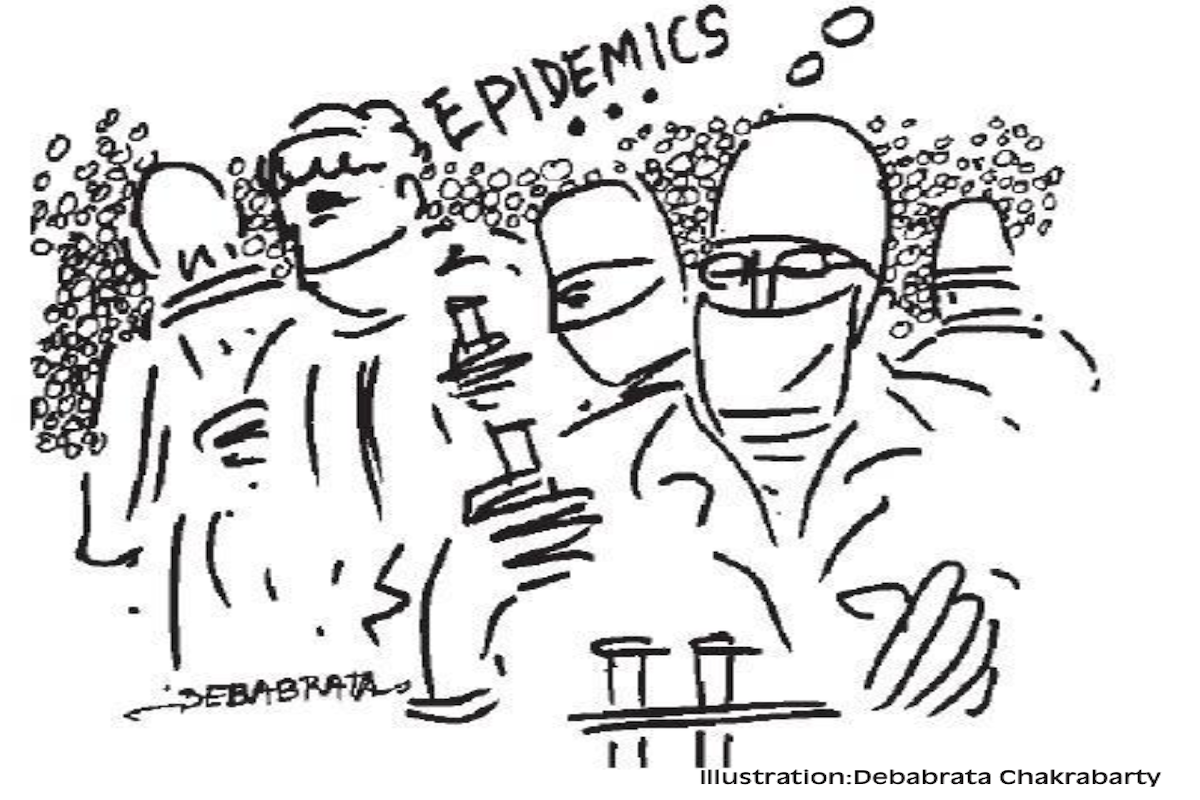It was the early morning flight to Washington via Qatar. A friend was driving me to Kolkata airport and said casually. “You are perhaps finishing your India vacation just in time.”
Seeing my questioning look, he added, “There are reports of an epidemic in central China, in Wuhan. Several people have died. China today, India tomorrow. Who knows how fast the disease will spread! It is good that you are leaving India now.”
Advertisement
It was the first week of February two years ago. Only a few airline staff wore masks and none of the passengers on my plane. When I landed in Washington, I saw not a single mask.
In two years, the world has morphed radically. As if a rampaging, the marauding army has marched through it, spreading death and devastation. 100 million sick, 2.5 million dead. Many of those who get infected and survive report lingering problems. Businesses have folded, and thousands have lost jobs. Schools have closed, forcing childcare on working parents. Older careers have been ruptured; young careers are at standstill; women’s careers are frozen and worse.
These global figures mask our personal tragedies. I lost a close friend and two colleagues, and another friend has recovered but is still bedridden. My daughter recovered unscathed but remembers the trauma as a period of suffering and separation.
This is precisely the time when we need to step back and look at our agony with fresh eyes. What does it all mean in our lives and how do we proceed?
The first step may be to shake off the victim syndrome. By calling it a pandemic, we are reinforcing the false notion that it is unprecedented in scale because of modern ease of travel. Every century had had its murderous epidemic, and even the last had four major ones, including one that sprang from India, and that killed a million people. This is without counting the AIDS blight that killed thirty million, not to mention the thirty million that still live thanks to new medicines. Flights were not that plentiful earlier, but people did travel, whether by trains or by camels and so did infectious diseases. It is good to remember that the 1918 plague alone took a toll of fifty million lives, twenty-five times the current Covid casualty.
Epidemics have happened before and, according to scientists, they will happen again. Given the dwindling habitats of animals and the closer contacts humans have with them, new viruses will spring from animals to people and create new diseases without remedies. The resulting epidemics are international, but our response is curiously parochial. At least thirty separate and expensive research initiatives started in different countries with no coordination. Pharmaceutical giants can be expected to race for the maximum profits, but governments that pledge to their people’s welfare showed not the slightest inclination to reduce the carnage – to cooperate with other countries by pursuing the best research avenues or ensuring the best distribution. An international agency like WHO that exists for this precise purpose was reduced to playing a second-order role of gathering national data and disseminating general information. If we want to save lives, we have to do better than rely only on the profit motive and national fervour.
A full reckoning is yet to come, but we know that the poorer countries have relatively suffered the most and, in the rich countries, the poor have borne the most painful brunt. One waits in vain for the imaginative international response that generated the World Bank to spearhead post-war reconstruction or the US leadership that created the Marshall Plan for European recovery. National economies have to revive themselves by their bootstraps, both by monetary policies that recharge private and public investment and by fiscal measures that try to reduce the huge, growing income disparity in many countries.
Let not these big issues make us forget about the puny individual who is at the centre of it all, the person, man or woman, who has to suffer through it all. For more than a year, that person has been a prisoner of four walls, no
less frustrating and painful because they are the walls of the person’s home. He cannot go out for a simple walk without putting a stifling mask on his face; he must not meet his buddies for a carefree chat in the corner café. She cannot go to her neighbour’s home and talk about the course she is teaching; nor can she take her child and enter the park where other mothers come with their children. Neither can happily go to their workplace, to their best friend’s home for a shared meal, to the local cinema for the new blockbuster. They feel life is stunted and confined, jaded and joyless.
No question we need others: friends and family members, colleagues and neighbours, business contacts and social acquaintances. We need them to enrich our lives. But we must not forget that, above all, we need to come to terms with our- selves. Our lives have become so fast-moving and leisure-killing that we have no time left to ourselves. We are, strange as it sounds, strangers to our- selves. The curse of the Coronavirus has come to remind us that we need to spend some time with ourselves. We need an hour – okay, a few minutes – to look at our life, take stock of our joys and pains, ask if we ought to do some course correction and take a step in a slightly different direction. Who knows, you may glimpse a new track, a track that you did not even know existed, that you will find closer to your lifelong dreams and infinitely more fulfilling.











